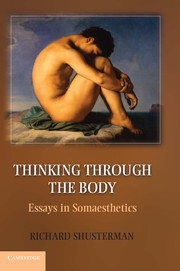Book contents
- Frontmatter
- Contents
- Preface
- Introduction
- Part I Somatic Being, Knowing, and Teaching
- Part II Somaesthetics, Aesthetics, and Culture
- 6 Somaesthetics and the Limits of Aesthetics
- 7 Somaesthetics and Burke's Sublime
- 8 Pragmatism and Cultural Politics
- 9 Body Consciousness and Performance
- Part III The Arts and the Art of Living
- Select Bibliography
- Index
- References
8 - Pragmatism and Cultural Politics
From Textualism to Somaesthetics
Published online by Cambridge University Press: 05 November 2012
- Frontmatter
- Contents
- Preface
- Introduction
- Part I Somatic Being, Knowing, and Teaching
- Part II Somaesthetics, Aesthetics, and Culture
- 6 Somaesthetics and the Limits of Aesthetics
- 7 Somaesthetics and Burke's Sublime
- 8 Pragmatism and Cultural Politics
- 9 Body Consciousness and Performance
- Part III The Arts and the Art of Living
- Select Bibliography
- Index
- References
Summary
I
Despite a name suggesting philistinism, pragmatism is fundamentally a philosophy of culture. If most philosophies readily recognize that culture is both an essential value and the ineliminable matrix of human life, pragmatism goes further by insisting that philosophy itself is essentially the historical product of culture, and therefore should (and does) change through more general cultural change. Philosophy's problems, values, terms, aims, and styles reflect those of the culture that shapes it. Even the most basic concepts of truth, knowledge, reality, meaning, and identity can derive their concrete significance only from the roles they play in the diverse practices of a culture. So pragmatism finds no helpful sense in the idea of an absolute, unmediated view of reality, a vision wholly independent of cultural shaping.
Pragmatism, therefore, is also an essentially pluralistic philosophy. Insisting on the plurality of values and beliefs expressed in the language games of different cultures and even in what we call a single culture, pragmatism affirms its pluralistic open-mindedness (which is more than mere tolerance) toward individuals who adopt these different perspectives. Culture can be made richer through the interchange of different views on life, which can stimulate productive new ways of thinking while also conserving valuable aspects of tradition. Deriving from the Latin for cultivation, the concept of culture carries a sense of value and improvement. As it shapes and unites the people who share it, so its value and its rich plurality of expression also make culture an essentially contested concept, with different factions debating over the precise meaning of culture, just as individuals and institutions compete for cultural prestige (whether in terms of prizes, market share, or government funding). Because it is both a publicly shared and contested good, culture is inevitably also a political arena, even if it claims to eschew the political for purer, higher values. If pragmatism is a philosophy of culture, then cultural politics should be a key pragmatist concern. This is especially true because pragmatism shares with culture an essential melioristic impulse: the desire to improve not only our theoretical understanding of culture but also the quality of our cultural products and the lived experience of culture itself. Moreover, like culture, pragmatist philosophy is a diverse and contested field, presenting no monolithic school but a variety of related approaches, a collection of different philosophical voices that, while sharing many of the same songs, often interpret them in contrasting ways.
- Type
- Chapter
- Information
- Thinking through the BodyEssays in Somaesthetics, pp. 166 - 196Publisher: Cambridge University PressPrint publication year: 2012



